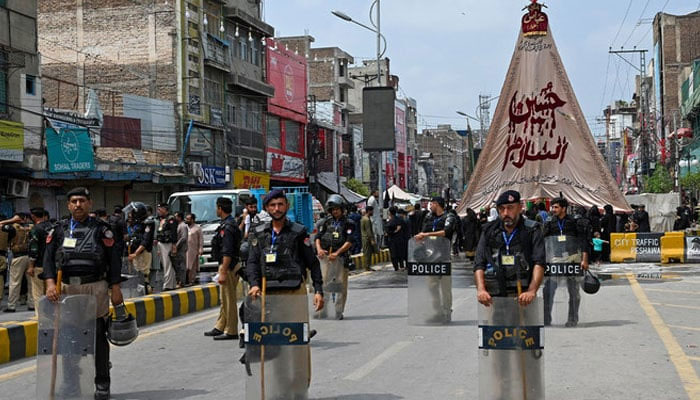Muharram security
Shia community’s mourning has over years been accompanied by sacrifices for practising their faith
The first ten days of Muharram are meant to be a period when Shias around the world mourn the sacrifices of Imam Hussain and his small force that took on the larger army of Yazid. The mourning culminates on Ashura, the day Imam Hussain and his family were martyred after a valiant fight. In Pakistan, unfortunately, the Shia community’s mourning has over the years been accompanied by sacrifices for practising their faith -- to the extent that the very act of taking part in an Ashura procession, though always loaded with religious and revolutionary spirit, becomes even more of an act of defiance. Given the threats the Shia community faces, including the open display of hate remarks by banned groups, it becomes essential for the government to introduce several security measures to protect the lives and property of Shias. While the last few years have been relatively peaceful -- to the extent that many people ask whether road closures are even necessary -- history suggests that these steps are necessary to prevent any untoward incident. Sectarian killings have been a blot on Pakistan, a glaring example of how unsafe the country can be for its minority communities. There had been a time (not too long ago) when religious gatherings of Shias were targeted, indiscriminately killing everyone present. In the late 2000s, an attack in Karachi on the Muharram 10 rally not only shook the entire country but also pointed out the glaring loopholes in security measures. Since then, successive governments have tried to make sure extremists do not repeat such a heinous attack. And, thankfully, it has been largely successful. But the threat has not gone away.
The fact that the Sindh government has banned at least 143 ulemas and zakirs from travelling and delivering speeches suggests that the threat is still here. However, it is important to remember that security doesn't necessarily come at the cost of personal freedoms. For example, only a few days back, the Punjab government’s request to suspend social media platforms for six days was denied. In a digital age, such measures are counterproductive. What the government can do is ensure that no insidious content is uploaded on these platforms. Authorities have to be vigilant, especially at a time when we have just had a couple of cases of mob lynching. Amidst all the rituals of Muharram, each loaded with significance for Shias, there is a greater message that should have a global resonance. Imam Hussain was one of the first true historical revolutionaries, someone who stood against the shifting tide represented by Yazid, and refused to submit to his authority. He refused to compromise his principles and conscience. Imam Hussain wanted to bring about positive change in as peaceful a manner as possible against forces that were well-practised in the art of war. This is the example all of us, no matter what our sect, should be taking heed of as we begin this Islamic year.
-
 Prevent Cancer With These Simple Lifestyle Changes
Prevent Cancer With These Simple Lifestyle Changes -
 Experts Reveal Keto Diet As Key To Treating Depression
Experts Reveal Keto Diet As Key To Treating Depression -
 Inter Miami Vs Barcelona SC Recap As Messi Shines With Goal And Assist
Inter Miami Vs Barcelona SC Recap As Messi Shines With Goal And Assist -
 David Beckham Pays Tribute To Estranged Son Brooklyn Amid Ongoing Family Rift
David Beckham Pays Tribute To Estranged Son Brooklyn Amid Ongoing Family Rift -
 Jailton Almeida Speaks Out After UFC Controversy And Short Notice Fight Booking
Jailton Almeida Speaks Out After UFC Controversy And Short Notice Fight Booking -
 Extreme Cold Warning Issued As Blizzard Hits Southern Ontario Including Toronto
Extreme Cold Warning Issued As Blizzard Hits Southern Ontario Including Toronto -
 Lana Del Rey Announces New Single Co-written With Husband Jeremy Dufrene
Lana Del Rey Announces New Single Co-written With Husband Jeremy Dufrene -
 Ukraine-Russia Talks Heat Up As Zelenskyy Warns Of US Pressure Before Elections
Ukraine-Russia Talks Heat Up As Zelenskyy Warns Of US Pressure Before Elections -
 Lil Nas X Spotted Buying Used Refrigerator After Backlash Over Nude Public Meltdown
Lil Nas X Spotted Buying Used Refrigerator After Backlash Over Nude Public Meltdown -
 Caleb McLaughlin Shares His Resume For This Major Role
Caleb McLaughlin Shares His Resume For This Major Role -
 King Charles Carries With ‘dignity’ As Andrew Lets Down
King Charles Carries With ‘dignity’ As Andrew Lets Down -
 Brooklyn Beckham Covers Up More Tattoos Linked To His Family Amid Rift
Brooklyn Beckham Covers Up More Tattoos Linked To His Family Amid Rift -
 Shamed Andrew Agreed To ‘go Quietly’ If King Protects Daughters
Shamed Andrew Agreed To ‘go Quietly’ If King Protects Daughters -
 Candace Cameron Bure Says She’s Supporting Lori Loughlin After Separation From Mossimo Giannulli
Candace Cameron Bure Says She’s Supporting Lori Loughlin After Separation From Mossimo Giannulli -
 Princess Beatrice, Eugenie Are ‘not Innocent’ In Epstein Drama
Princess Beatrice, Eugenie Are ‘not Innocent’ In Epstein Drama -
 Reese Witherspoon Goes 'boss' Mode On 'Legally Blonde' Prequel
Reese Witherspoon Goes 'boss' Mode On 'Legally Blonde' Prequel




